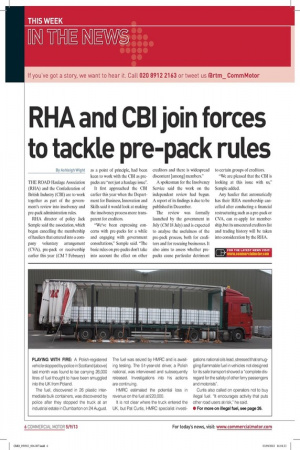RHA and CBI join forces to tackle pre-pack rules By Ashleigh Wight
Page 4

If you've noticed an error in this article please click here to report it so we can fix it.
THE ROAD Haulage Association (RHA) and the Confederation of British Industry (CBI) are to work together as part of the government's review into insolvency and pre-pack administration rules. RHA director of policy Jack Semple said the association, which began cancelling the membership of hauliers that entered into a company voluntary arrangement (CVA), pre-pack or receivership earlier this year (CM 7 February)
as a point of principle, had been keen to work with the CBI as prepacks are "not just a haulage issue".
It first approached the CBI earlier this year when the Department for Business, Innovation and Skills said it would look at making the insolvency process more transparent for creditors. "We've been expressing concerns with pre-packs for a while and engaging with government consultations," Semple said. "The basic rules on pre-packs don't take into account the effect on other
creditors and there is widespread discontent [among] members."
A spokesman for the Insolvency Service said the work on the independent review had begun. A report of its findings is due to be published in December. The review was formally launched by the government in July (CM 18 July) and is expected to analyse the usefulness of the pre-pack process, both for creditors and for rescuing businesses. It also aims to assess whether prepacks cause particular detriment
to certain groups of creditors.
"We are pleased that the CBI is looking at this issue with us," Semple added.
Any haulier that automatically has their RHA membership cancelled after conducting a financial restructuring, such as a pre-pack or CVA, can re-apply for membership, but its unsecured creditors list and trading history will be taken into consideration by the RHA.
PLAYING WITH FIRE: A Polish-registered vehicle stopped by police in Scotland (above) last month was found to be carrying 26,000 litres of fuel thought to have been smuggled into the UK from Poland.
The fuel, discovered in 26 plastic intermediate bulk containers, was discovered by police after they stopped the truck at an industrial estate in Dumbarton on 24 August.
The fuel was seized by HMRC and is awaiting testing. The 51-year-old driver, a Polish national, was interviewed and subsequently released. Investigations into his actions are continuing.
HMRC estimated the potential loss in revenue on the fuel at £20,000. It is not clear where the truck entered the UK, but Pat Curtis, HMRC specialist investi
gations national oils lead, stressed that smuggling flammable fuel in vehicles not designed for its safe transport showed a "complete disregard for the safety of other ferry passengers and motorists".
Curtis also called on operators not to buy illegal fuel. "It encourages activity that puts other road users at risk," he said.
• For more on illegal fuel, see page 26.









































